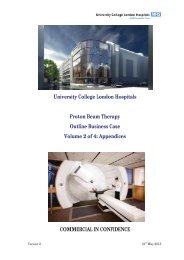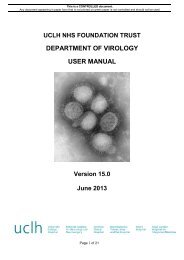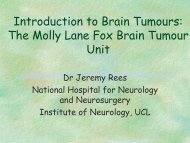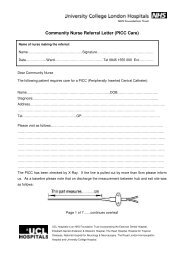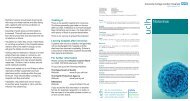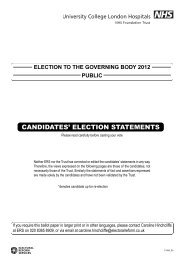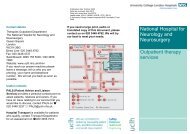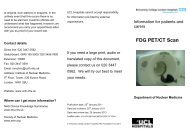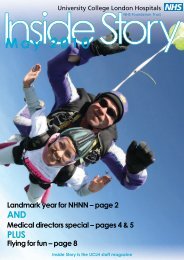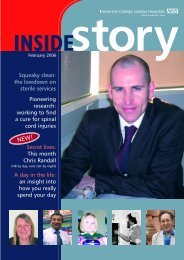How patients have helped us with our research - University College ...
How patients have helped us with our research - University College ...
How patients have helped us with our research - University College ...
You also want an ePaper? Increase the reach of your titles
YUMPU automatically turns print PDFs into web optimized ePapers that Google loves.
PATIENT CASE STUDIES 15 17<br />
© Dr Tim Carter, Centre for Medical<br />
Image Computing (CMIC), UCL<br />
MRI scan of prostate tum<strong>our</strong><br />
The challenge for the <strong>research</strong><br />
team was to enlist <strong>patients</strong><br />
willing to undergo several<br />
demanding and unpleasant<br />
procedures to give them the<br />
information they needed.<br />
Imaging has long been <strong>us</strong>ed to<br />
pinpoint cancer in other parts<br />
of the body, but before it could<br />
be <strong>us</strong>ed for diagnosing prostate<br />
cancer, <strong>research</strong>ers needed to<br />
find out what cancer looks like<br />
in a scan of the prostate.<br />
To find this out they needed to<br />
sample the whole prostate of<br />
each study participant by taking<br />
biopsies every 5mm. For this<br />
the men needed to be under<br />
general anaesthetic. They also<br />
needed to <strong>have</strong> an MRI scan<br />
and biopsies via the rectum.<br />
Two patient representatives,<br />
who are part of Professor<br />
Emberton’s study group, were<br />
concerned whether men<br />
would be willing to take part<br />
in such a demanding study.<br />
It was clear the men would<br />
benefit personally from greater<br />
accuracy offered by the surgical<br />
biopsy of the whole prostate.<br />
<strong>How</strong>ever, the men were unlikely<br />
to benefit from the biopsies<br />
taken via the rectum. The<br />
patient representatives advised<br />
the team simply to be very open<br />
and explicit about this.<br />
I advised them to tell<br />
[prospective recruits]<br />
like it is and not to<br />
dress it up<br />
Robert Oldroyd, one of the<br />
patient representatives who<br />
is familiar <strong>with</strong> <strong>research</strong> in<br />
the field, said: “The team did<br />
recognise the burden we were<br />
placing on <strong>patients</strong>, but it’s one<br />
of those trials where you can’t<br />
do much else. So I advised them<br />
to tell [prospective recruits] like<br />
it is and not to dress it up… I<br />
look at it from a practical and<br />
logistical point of view. <strong>How</strong> will<br />
<strong>patients</strong> deal <strong>with</strong> it? Will they<br />
be happy to go through all the<br />
procedures? And will it actually<br />
improve their subsequent<br />
treatment?”<br />
Finding less invasive<br />
treatments for prostate<br />
cancer<br />
Patients are also working <strong>with</strong><br />
Professor Emberton’s team<br />
to develop new treatments<br />
for prostate cancer. Professor<br />
Emberton says <strong>patients</strong> <strong>have</strong><br />
had a major role in guiding the<br />
direction of <strong>research</strong> at UCLH<br />
into new treatments: “They<br />
are very good at p<strong>us</strong>hing <strong>us</strong> to<br />
be clear about the therapeutic<br />
objectives and the benefits.”<br />
Finding new treatments is<br />
important beca<strong>us</strong>e standard<br />
surgery and radiotherapy for<br />
prostate cancer can damage



